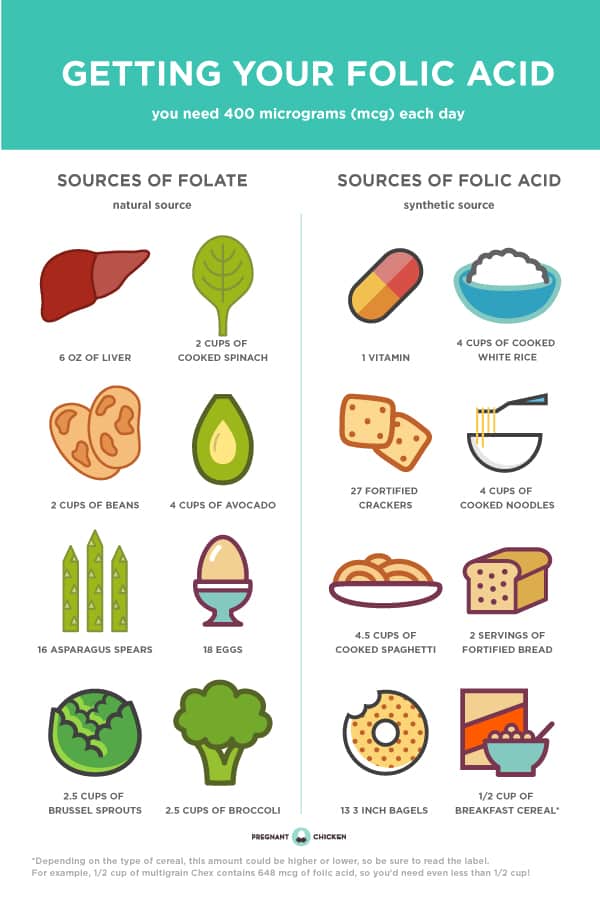Recently, the Center for Disease Control authored a study which was published in the Journal of Women’s Health that found that daily multivitamin use among women of reproductive age is declining. Why is this such a big deal? Two words: Folic Acid.
What is folic acid?
According to the CDC, “folic acid is a B vitamin. If a woman consumes enough folic acid before and during early pregnancy, it can help prevent her baby from having a neural tube defect”.
Why is it important?
You may have heard that it’s important to start taking prenatal vitamins even before you get pregnant. As it turns out, you should actually be taking them (or a multivitamin) even if you have no plans to get pregnant. Why? Because it can actually take months before consuming the recommended daily dose of folic acid creates a stable blood folate concentration that will help prevent neural tube defects in a growing baby. And, bad news – you can’t cheat and double up on your multivitamin to build up that concentration faster.
So, whether or not you were planning on becoming pregnant, if you do find yourself with a bun in the oven, it’s super important to make sure it’s been fortified with a sufficient amount of folic acid. Mothers who are low in folate are unknowingly putting their babies at risk for two serious neural tube defects – spina bifida and anencephaly.
What are Spina Bifida and Anencephaly?
Unfortunately, these defects which affect the brain, spine, or spinal cord happen before most women even realize they’re pregnant. The CDC defines anencephaly as “a serious birth defect in which a baby is born without parts of the brain and skull”. Sadly, babies born with anencephaly cannot survive this condition. Spina bifida can range in severity and occurs when the neural tube doesn’t close the way it should, resulting in damage to the spinal cord and nerves.
Okay, I’m sold. How much folic acid should I take?
The recommended daily dose of folic acid is 400 micrograms (mcg). The CDC has recommended that women can achieve this important daily dose either by taking a multivitamin with folic acid included, by eating fortified foods, or by combining the two and getting the best of both worlds.
Is folic acid the same as folate?
While folate can be found naturally in many foods, folic acid is synthetic and is used in supplements and fortified foods. According to the CDC, only folic acid has been scientifically tested and proven to prevent neural tube defects.
Does it occur naturally?
Great news! Folate does occur naturally in many foods (folic acid, on the other hand, is a synthetic form of folate, which is added to foods). The Office of Dietary Supplements states that folate is present in “vegetables (especially dark green leafy vegetables), fruits and fruit juices, nuts, beans, peas, seafood, eggs, dairy products, meat, poultry, and grains.”
If you’re on the hunt for folate superfoods, you’ll be happy to know that all of the foods that haunted your dreams as a kid (aka spinach, liver, asparagus and brussels sprouts) top the list.
As of January 1998, all enriched breads, cereals, flours, cornmeals, pastas, rice and other grain products were mandated to have 140 mcg of folic acid added to every 100 grams of the product. One important thing to note is that different people process folate in different ways, due to a gene variation related to the MTHFR enzyme. While individuals with TT or CT genotypes can metabolize folic acid, the process takes longer than people without this gene variation. For these ladies, taking a multivitamin with folic acid is super important, as it can actually reduce the risk of having a baby with a neural tube defect by 85%. You can find more information on it here.
The chart below contains a list of foods that include either folate or folic acid. The Percent DV (Daily Value) shows that even the foods highest in folate just reach (at most) half of the recommended daily serving of folate. This link has a pretty extensive list of foods fortified with folic acid. Good news if you’re a cereal lover – if you’ve ever had a hard time defending your Lucky Charms addiction, you can now let everyone know that it’s one of many cereals that contains your daily recommended dose of folic acid (there are probably some healthier options on the list, too).

Takeaway
Whether or not you’re entertaining the idea of having babies, by taking folic acid you’re decreasing your risk of heart disease, stroke, and potentially even some cancers. So, do the CDC, your body, and any potential future babies a favor – dust off your multivitamins, start poppin’ those suckers, and get your 400 mg per day.




Leave a Comment